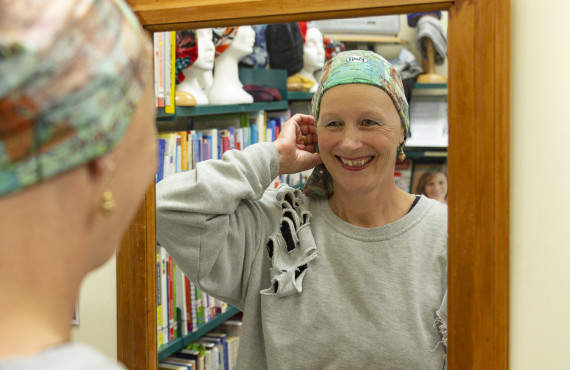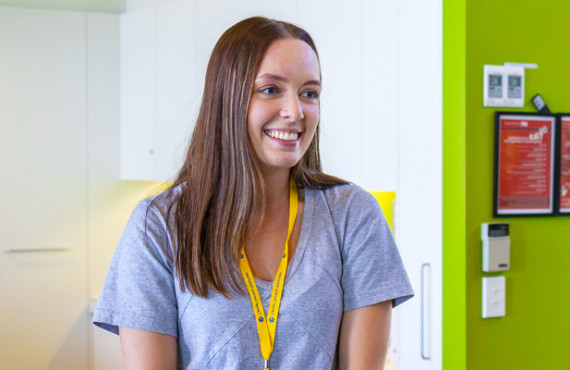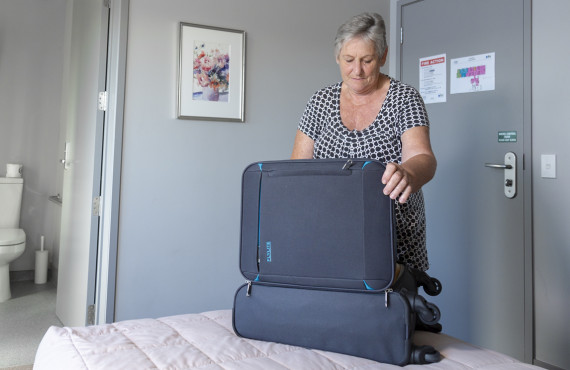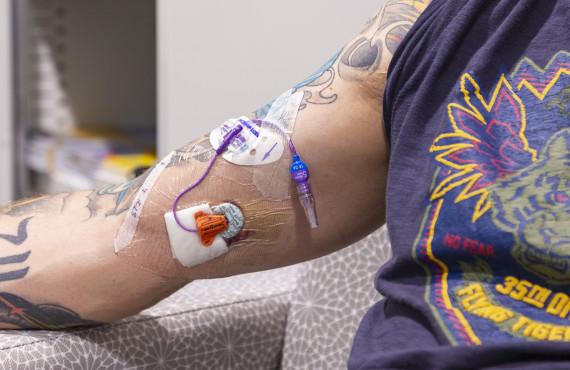Radiation treatment is one of the most common treatments for cancer. Knowing what to expect from this treatment can help you prepare.
What is radiation treatment?
Radiation treatment uses radiation beams to destroy cancer cells or slow their growth. It is also called radiation therapy or radiotherapy.
The radiation treatment is carefully planned to affect only the part of the body at which the beams are aimed.
Cancer is a disease of the body's cells. It starts in our genes. Our bodies are constantly making new cells, a process controlled by certain genes. Cancers are caused by damage to these genes. As the damaged cells replicate a lump or tumour is formed.
Tumours can be:
- Benign - not cancerous. These do not spread to other parts of the body.
- Malignant - cancerous
How radiation treatment works
Radiation treatment destroys cancer cells that are dividing. It also affects normal tissue cells, which is what causes side effects.
For each person receiving radiation treatment, a decision is made about how much treatment to give without causing too much damage to normal tissue.
Normal cells can repair themselves after this damage, but cancer cells cannot.
When is radiation treatment used?
Radiation treatment can be used to:
- cure cancers, often in addition to other treatment
- to shrink a tumour so that surgery is more effective
- to treat any cancer cells remaining after surgery
- to slow the growth of cancer or relieve symptoms
Your treatment team will offer the best treatment for you based on the type and stage of cancer as well as your general health.
This means you may have different treatments from someone else, even if their cancer type is the same type as yours.
Before any treatment begins, make sure that you have discussed and understood your treatment team's advice. You may ask for a second opinion if you want one.
Types of radiation treatment
Radiation treatment can be given outside the body or internally by placing a radioactive source inside the body.
External radiation treatment
During treatment, you will lie still and the machine will move around you so that the radiation can be directed at the tumour from different angles, similar to having an X-ray.
Internal radiation treatment
If you have internal radiation treatment, a radioactive source will be placed into the body close to your cancer, or into the cancer itself.
By doing this, high doses of radiation can be delivered exactly where the cancer is, without having to go through healthy tissue.
Planning your radiation treatment
Before your treatment begins, you will meet with a radiation oncologist, who will explain why you need this treatment, what will happen and when it will take place.
While you are having radiation treatment you will need to use a reliable form of birth control.
It is important that neither you nor your partner becomes pregnant, as radiation treatment may harm a developing baby.
If you are pregnant now, talk to your treatment team immediately.
Will radiation treatment make me radioactive?
For external radiation treatment, you will not be radioactive.
It is safe to be with your children, family/whānau and friends throughout the treatment and afterwards.
For internal radiation treatment, where a radioactive source is put inside your body, you will need to take extra care.
If the source is temporary, you will only be radioactive when it is in your body. This is all done in the hospital.
If the source is not removed or permanent, you will be radioactive for a short time.
People won't be able to see you're radioactive. It is important to follow your treatment team's safety instructions.
Going through cancer treatment can be overwhelming, and you may have many questions.
It's a good idea to think about what you'd like to know and what you do not want to be told before you go to your appointments. You may want to have a support person with you when you visit.
Here is a list of questions you may wish to ask:
- What are the advantages and disadvantages of radiation treatment for me?
- Are there any other treatments I can have instead?
- Will radiation treatment cure me or keep my cancer under control?
- What difference would it make if I waited?
- Can I have a second opinion?
- Can I have radiation treatment at my local hospital, or will I have to travel?
- If I need to travel away from home for my treatment appointments, what financial support and accommodation are available?
- How long will my treatment last, and how often will I have to have it?
- Will I have to stay in hospital?
- Which part of my body will be treated?
- How long will each treatment take?
- Will I be able to carry on with my normal life when I am not at the hospital?
- If I can have the treatment privately, how much will it cost?
- What side effects can I expect?
- Can the side effects be managed?
- How long after my treatment ends, will it take for the side effects to go?
- Will there be any permanent side effects?
- Will I still be able to have children?
- Should I keep taking my usual medicines?
- Do I need a special diet?
- what is the waiting list for this treatment?
- If I have to wait to have treatment, will it affect my health?
- Will the treatment affect my sex life?
If there are answers you do not understand, it is okay to say, for example:
- would you explain that again, please?
- I am not sure what you mean by that?
- would you draw a picture or write it down, please?
When I was having my treatment I used to ask a lot of questions, but staff were always happy to answer, even if I’d asked them before.
Garry
Side-effects of radiation treatment
The side effects of radiation treatment will depend on what part of your body is being treated as well as the type and amount of radiation you are given.
Side-effects of radiation treatment can include:
- feeling tired or weak (fatigue)
- dry, red or itchy skin
- pain
- hair loss
- not wanting to eat
- feeling sick and vomiting
- bladder and bowel problems
- mouth and throat problems
- effect on the pelvic area
- issues with getting pregnant (fertility)
- lymphoedema
Using other medications or treatment
Some people with cancer might also think about using complementary therapies or traditional healing.
It is important to let your treatment team know about any other medicines or supplements you are taking so they can check for any known reactions.
The area of your body receiving radiation treatment should not be massaged during treatment and for several weeks afterwards. Massage may make side effects worse.
Radiation treatment in Aotearoa New Zealand
Radiation treatment is available in these specialist treatment centres across the country:
- Auckland
- Hamilton
- Tauranga
- Palmerston North
- Wellington
- Christchurch
- Dunedin
If you have to travel for your radiation treatment, the Cancer Society can help provide transport or accommodation if you're away from home.

How to manage the symptoms of cancer and the side effects of treatment.

We are here to help and support you and your whānau through cancer diagnosis, treatment and recovery…

If you need to travel to receive cancer treatment we may be able to help with accommodation

How your sex life is affected will depend on what treatment your having and what parts of your body …
We know that going through cancer is tough and can raise many questions. You are not alone.
We have health professionals to answer your questions and provide the support you need.
Get in touch
